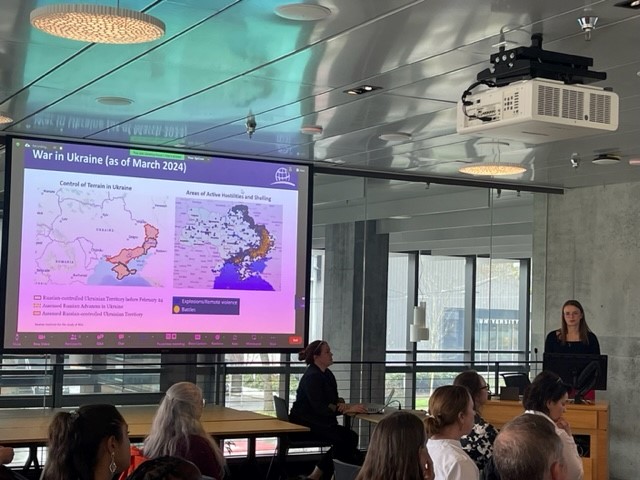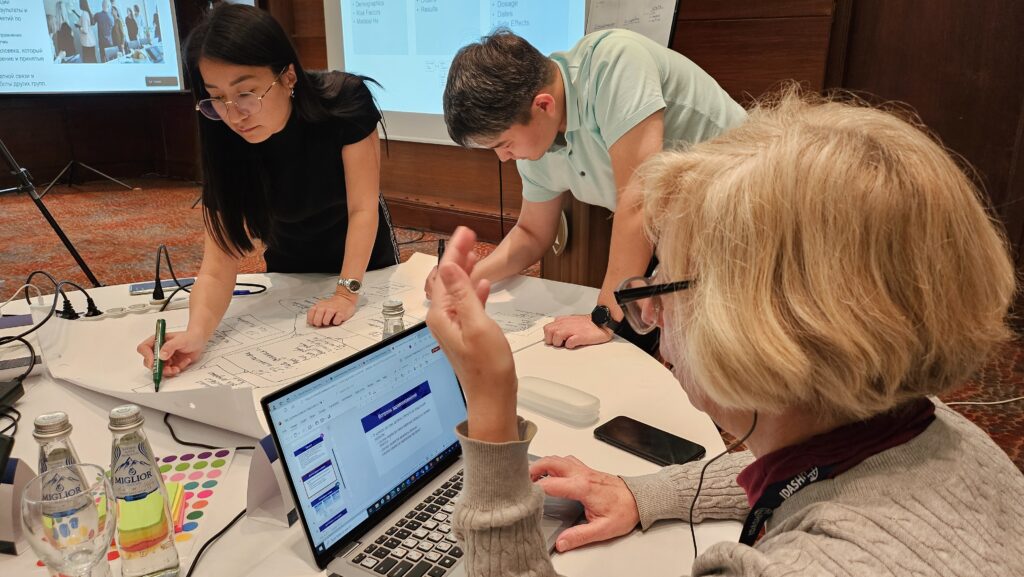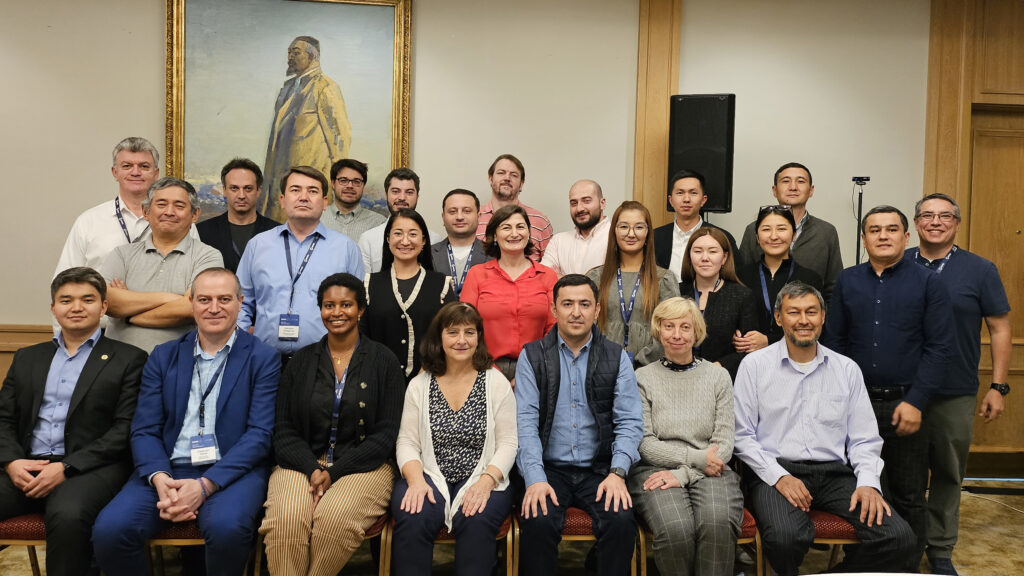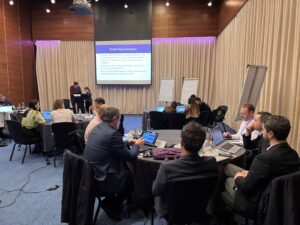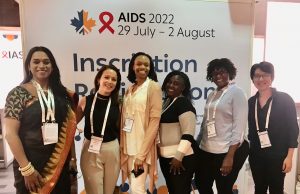
Since the Russian invasion and onset of full-scale war in 2022, the International Training and Education Center for Health (I-TECH) has been strengthening its capacity to provide support for healthcare workers (HCWs) in Ukraine. Key support programming has included a mental health project targeting both HCWs and people living with HIV (PLHIV), delivered as part of its national Pre-exposure Prophylaxis (PrEP) Program.
The Ukrainian population is experiencing high rates of post-traumatic stress disorder (PTSD) and other mental health disorders as a result of the war in Ukraine. One recent study found that 30.8% of its Ukrainian respondents met criteria for elevated risk of PTSD, with internally and externally displaced people showing significantly higher rates of risk.1 Another found that 52.7% of its Ukrainian sample aged 18 years or older showed symptoms of psychological distress, 46.8% of depression, and 12.1% of insomnia.2
“As time goes on, the greater the need for support for healthcare professionals becomes.”
– Olena Frolenkova, counselor
These numbers include not only the general population, but also the physicians, nurses, and other HCWs who continue supporting their fellow Ukrainians amid the war. These professionals put their own safety and mental health on the line every day to provide compassionate care to their communities in a time of immense crisis.
“Our medical doctors and nurses remain on the frontlines of the humanitarian responses, dealing with unimaginable loss and trauma daily, both professionally but also personally,” says Anna Shapoval, EdD, Country Representative for I-TECH Ukraine.
By mid-2024, the growing team of I-TECH counselors has conducted 325 planned individual online supportive supervision, including counseling, sessions for HCWs. Out of those, 45% of sessions were requested by HCWs due to a complex psychological and emotional condition. Key topics for supervision sessions were the psycho-emotional conditions of medical providers, discussions of actual working cases, management of complex consulting cases, and team interactions.
At the same time more than 3,500 PLHIV were screened for depression, out of them around 10% were diagnosed with such and referred for specialized care as part of this project. I-TECH’s team also invests significant time and resources into strengthening the counseling capacities of the HCWs and sharing information on the importance of mental health and related services available in each region of Ukraine among patients of its PrEP Program.
In recent months, the I-TECH team in Ukraine has expanded mental health program activities within its PrEP Program and hopes to continue this expansion through enhanced mental health education, counseling, and supervision for HCWs, focus on additional target groups such as military, veterans and their family members, and other related activities in 2025.
“The I-TECH Ukraine team is immensely grateful to its funders – the U.S. Health Resources and Services Administration (HRSA) through the President’s Plan for Emergency AIDS Relief (PEPFAR) in Ukraine – for their proactive position in regard to the mental health needs of HCWs, PLHIV, and PrEP patients in Ukraine,” says Ms. Shapoval. “As a result, since 2022 I-TECH Ukraine has received additional funding and guidance from its partners that have enabled immediate tailored response and development of the mental health programming that now represents a vital part of our daily activities in Ukraine.”
Ongoing expansion is critical, says Ms. Shapoval, to meet the increasing needs of both HCWs and their patients. Natalia Tiuleneva, lead mental health counselor with I-TECH, agrees: “Currently, medical specialists in Ukraine see a large number of patients who come to their appointment not only with somatic problems, but also with emotional flooding due to the war,” says Ms. Tiuleneva. “With each patient, the doctor experiences an individual patient war each time. This is a big mental burden…. Doctors complain of fatigue and the inability to process so much mental pain.
“It is important for us to save each other,” she continues. “It is important to protect highly qualified specialists. People are capable of a lot when they have a place where their resilience will be noticed and preserved. This culture of professional support in the medical community is promoted by our program, and it is slowly taking root.”
A couple of these examples are below.
A mother, a daughter, and their doctor make progress
A PrEP patient arrived at her doctor’s appointment with her 13-year-old daughter, who had been raped by her HIV-positive stepfather. While the offender was under investigation by the police, he continued to live in their shared housing. After testing, the girl was found to have HIV.
The doctor provided highly professional, compassionate support and consultation, but after the appointment she noted that her personal psychological condition had worsened, and she could not sleep at night. She contacted an I-TECH psychologist for help.
During the session, the psychologist led the doctor through a series of breathing and grounding exercises to lower her stress level. Afterward, she outlined recommendations to be shared with the patient and her mother:
- To ensure the safety of the girl, she and her mother should end all contact with the offender and find another place to live.
- The mother should contact a psychologist for her daughter that specializes in sexual trauma.
At a follow-up appointment a month later, the doctor, mother, and child worked together on assimilating the daughter’s experience, a therapeutic method that has shown to decrease the intensity of symptoms.3 As a result of the doctor’s interventions, as well as the help of other specialists, the child is now receiving antiretroviral therapy (ART) and psychological counseling, and she and her mother were able to move to a shelter for survivors of violence.
“I am inspired by the strength in these stories. The power to be human, the power to help others, the power to overcome life’s challenges and trials, the power to become stronger.”
—Diana Martyniuk, counselor
For her part, the doctor’s sleep has improved, and her stress levels have decreased. “Finally, I can consult [the mother and child] as my regular patients,” she says.
Empathy leads to overload, and a request for help
During a scheduled session with an I-TECH psychologist, a doctor reported that she was in a difficult emotional state due to the stress of war. The doctor was worried because she often woke up at night with an accelerated heartbeat and a feeling that something terrible was about to happen. Often, she could not fall asleep for a long time and felt overall depressed.
She then mentioned a challenging case from her clinical practice that had been weighing on her heavily.
A 50-year-old patient of hers had been in serious condition with COVID-19. Every day, the doctor was tasked with telling the woman’s son, who served in the military, that his mother’s condition was getting worse. Over time, providing quality support and feeling compassion for the patient and her son had led to emotional overload and exhaustion for the doctor. When her patient died, the son’s grief—and even his gratitude toward her—compounded the doctor’s mental overwhelm.
To address these issues, the physician turned to the I-TECH psychologist again, requesting an additional session. After practicing self-regulation exercises shared during the session, the doctor reported that her sleep stabilized, her well-being improved, and her mood fluctuations decreased.
In a follow-up text to her counselor, the doctor reported: “I started working again, tomorrow it is going to be two weeks…. I completed the activities we discussed. I feel better. I have a different mood, I feel calmer.”
“During the hostilities in Ukraine, the burden on all doctors has increased,” says counselor Nadiya Bruyaka. “In addition to the increase in the number of patients and the severity of their personal stories, other challenges have been added that they had no experience with before: blackouts, Internet outages, air raids, distance learning of one’s own children and anxiety for them during air raids, the presence of relatives and friends in the Armed Forces and increased anxiety for their lives, feelings of uncertainty and helplessness.
“It’s all exhausting,” she continues, “and it is during sessions that doctors and nurses have the opportunity to share their personal condition, understand it, and get support and practical recommendations.”
1 Ben-Ezra M, Goodwin R, Leshem E & Hamama-Raz Y. (2023). PTSD symptoms among civilians being displaced inside and outside Ukraine during the 2022 Russian invasion. Psychiatry Res. 2023 Feb:320:115011. doi: 10.1016/j.psychres.2022.115011. Epub 2022 Dec 17.
2 Xu W, Pavlova I, Chen X, Petrytsa P, Graf-Vlachy L & Zhang SX. (2023). Mental health symptoms and coping strategies among Ukrainians during the Russia-Ukraine war in March 2022. Int J Soc Psychiatry. 2023 Jun;69(4):957-966. doi: 10.1177/00207640221143919. Epub 2023 Jan 4.
3 Basto IM, Stiles WB, Rijo D, and Salgado J. Does assimilation of problematic experiences predict a decrease in symptom intensity? Clin Psychol Psychother. 2018 Jan-Feb; 25(1): 76–84.

